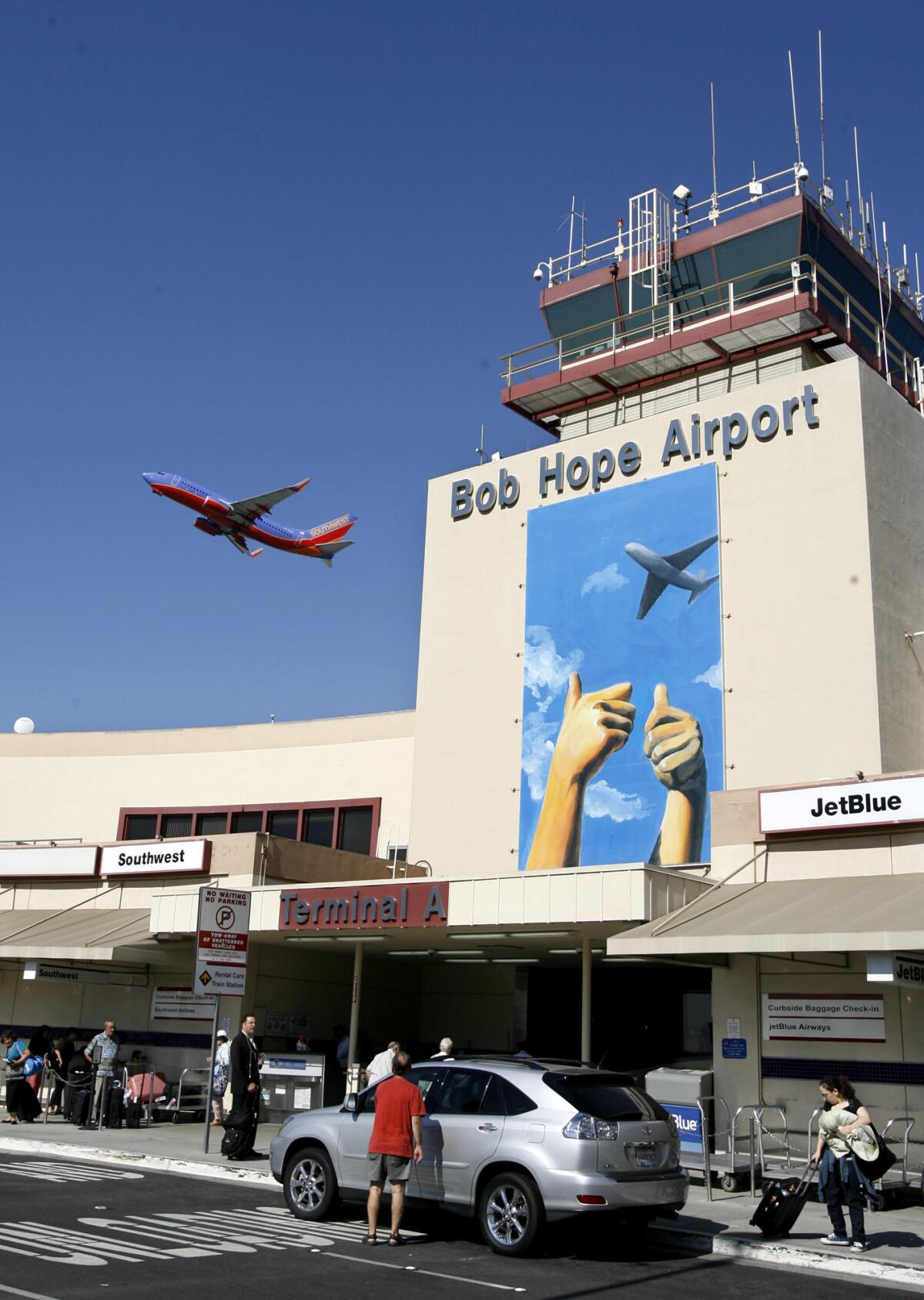Council, Bob Hope Airport officials close in on agreement for replacement terminal

In this Oct. 2012 file photo, an airplane takes off at the Bob Hope Airport.
Officials from the city of Burbank and the Burbank-Glendale-Pasadena Airport Authority could soon be heading to Washington, D.C., to meet with the Federal Aviation Administration to discuss, with help from Rep. Adam Schiff (D-Burbank), their support for a mandatory curfew at Bob Hope Airport.
That’s one of the key new points in a proposed agreement between the city and the authority that would allow for plans for a 14-gate replacement terminal to move forward. An overview of the agreement, not yet in formal legal documents, was released by the city this week following a unanimous City Council decision Tuesday to make it available to the public.
“It’s just a conceptual term sheet,” said Mayor Bob Frutos. “All five of us are very adamant to bring this out to the public once and for all where we’ll be able to discuss what the merits of the proposal [are] ... and the community can weigh in on what your thoughts are.”
The council is set to discuss the terms during its regular meeting Tuesday in City Hall, 275 E. Olive., at 6 p.m. The airport authority is expected to discuss the proposal at its meeting on Nov. 2, in the Skyroom of the Bob Hope Airport, 2627 N. Hollywood Way, at 9 a.m.
The document is largely the same as a proposal put forward by the airport authority at a joint meeting in July, with most changes clarifying the meaning of certain aspects of the agreement, elected officials said. The terms are “just preliminary, but that’s where we are now,” Frutos said.
The City Council agenda, with a staff report about the matter and both the latest term sheet and the July proposal, can be viewed online at the city’s website.
If the proposal is accepted by both the city and the airport authority, an environmental review for the new terminal would still need to be completed, along with public hearings and City Council approvals. Additionally, Burbank voters would have to approve the replacement terminal if it is approved by the city council.
“This is the first step in still a very long process and the Burbank voters will have the final say-so,” Frutos said.
After decades of tension and years of back-and-forth between the city and the airport, including setbacks in recent months and incremental negotiations, mostly behind closed doors, officials think they’re closer to an agreement than they’ve ever been.
“We’re there,” said Dan Feger, the airfield’s executive director, in an interview Friday.
The requirement that city and airport officials travel to Washington to meet with FAA administrators does not require the implementation of the nighttime flight restrictions, but it does up the ante for the airport, which in July and earlier had committed not to withdraw support for the curfew, but had not gone as far as proposing a lobbying trip.
Burbank has long sought the curfew, but in 2009, the FAA disapproved the airport’s application for a full nighttime curfew and in 2011 and 2014, Congress voted down Schiff’s proposals for a mandatory curfew. A voluntary curfew bars commercial airline flights between 10 p.m. and 7 a.m., but it does not apply to cargo flights or private planes.
Feger said the proposal offers other powerful protections to both the airport and the city. For example, it outlines a change to the agreement governing the authority board, which he has said would increase the strength of Burbank’s voting position on certain decisions, such as those affecting the number of gates or size of the replacement terminal.
Under the proposed terms, such decisions would require a “supermajority” vote of at least two out of three commissioners from each city, meaning a two-person coalition from Burbank could block such changes.
Frank Quintero, the board’s president who represents Glendale, said the relationship between the city and the airport had hit a low point more than a decade ago, but the parties have bounced back. He said he feels great about where things stand now. But, Quintero added, Glendale and Pasadena did not “casually” give in to changing the governing agreement.
“We had to settle our issues,” Quintero said. “It made no sense [not to] cooperate with the city of Burbank.”
--
Chad Garland, chad.garland@latimes.com
Twitter: @chadgarland